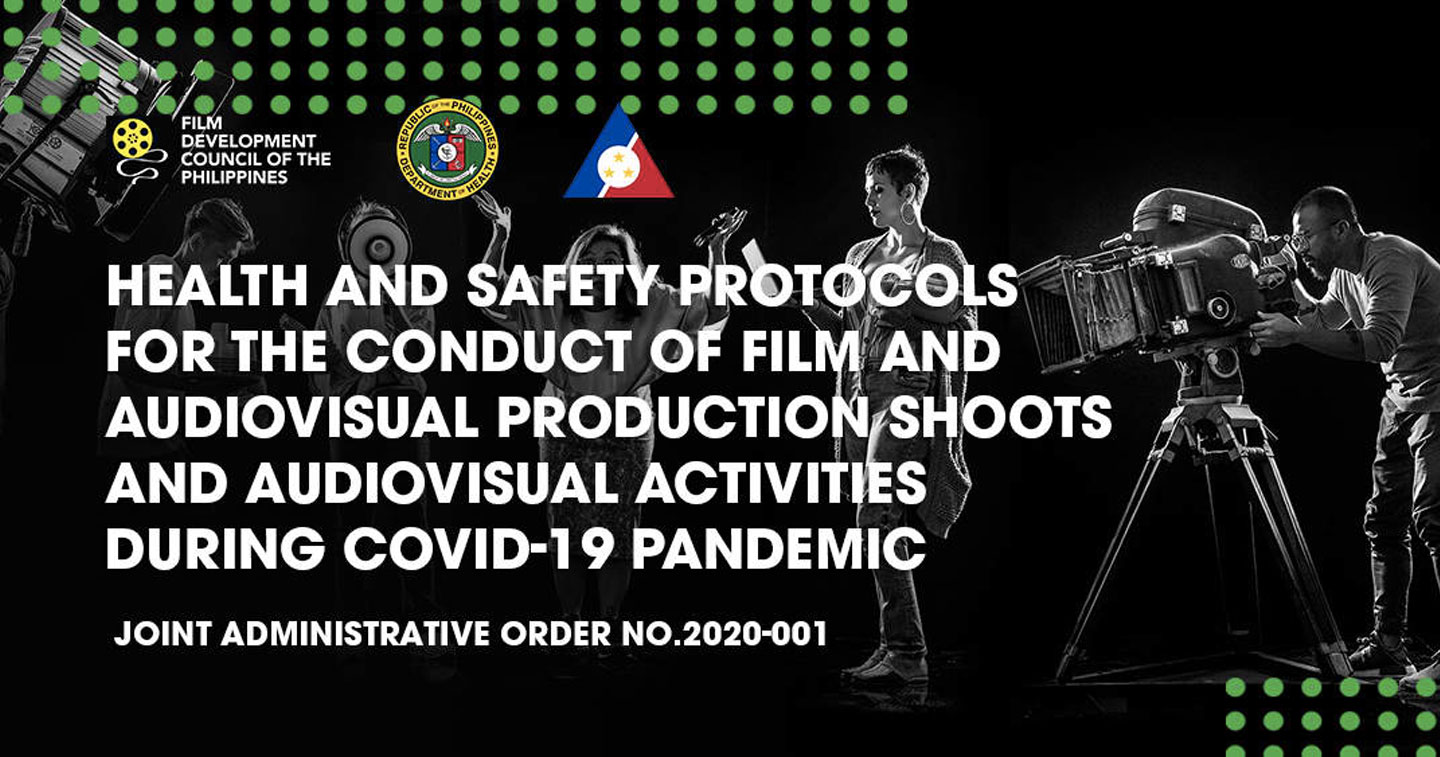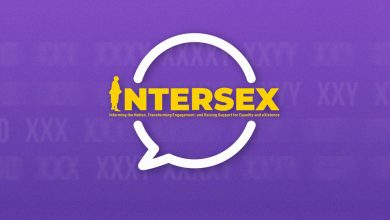MANILA, PHILIPPINES — On June 7, 2020, the Department of Health (DOH), Department of Labor and Employment (DOLE), and Film Development Council of the Philippines (FDCP) released Joint Administrative Order (JAO) No. 2020-001 on the Health and Safety Protocols for the Conduct of Film and Audiovisual Production Shoots and Audiovisual Activities During COVID-19 Pandemic (hereinafter referred to as “JAO”).
The JAO is a tripartite government issuance that sets the minimum public health and safety standards that production shoots must abide by in order to ensure that all film and audiovisual content workers are protected as operations resume during the pandemic. As line agencies that cover all sectors, DOH and DOLE collaborated with FDCP which served as a participating agency in providing context, inputs, and recommendations on the health and safety guidelines governing film and audiovisual production activities.
On June 27, 2020, with the goal to clarify and allow the sectors within the audiovisual industry to resume operations, as well as reiterate the salient points in the JAO, the FDCP released Advisory No. 6. Upon the issuance of the JAO and the Advisory, numerous statements from various organizations in the industry were released questioning its scope and coverage, and the alleged lack of consultations with stakeholders during the course of the drafting of the JAO.
On July 6, 2020, an inter-agency meeting was held to discuss these issues. This statement is jointly released by the DOH, DOLE, and FDCP to address the following concerns and misconceptions:
1. On the Mandates of Each Partner Agency to Provide Protocols
Consistent with the state policy of full protection to labor and promotion of full employment, the DOLE shall provide for safe, decent, humane and improved working conditions and environment for all workers. In particular, Republic Act No. 11058 otherwise known as the Occupational Safety and Health and Standards Act, mandates DOLE to ensure a safe and healthful workplace to include establishments, projects, sites, and all other places where work is being conducted. Section 25 thereof empowers the Secretary of Labor and Employment to set and enforce mandatory OSH Standards in consultation with other government agencies and relevant stakeholders based on the number of workers, nature of business operations and the risks or hazards involved.
Meanwhile, the DOH is mandated to develop national plans, technical standards, and guidelines on health. In response to the national public health emergency, DOH issued public health standards including sector-specific health guidelines, to mitigate the spread of COVID-19. Inputs on minimum public health standards were included in the JAO to ensure the health and safety of all members of the film and audiovisual industry.
As the Agency catering to the film industry, the FDCP provided context and recommendations on the drafting of the JAO. Its responsibility in the JAO is to facilitate the streamlined registration process of production shoots and coordinating the same to DOLE and Local Government Units (LGUs) so that these authorities may ensure compliance to the JAO by facilitating inspections of the activities in production shoots.
2. On the Coverage of the JAO
It must be emphasized that the protocols of the JAO are only concerned with safety and health guidelines in the conduct of production shoots, the qualifier of which is the presence of workers in a production set, and the shooting of content with equipment and recording for platforms.
Regardless of the format (film, TV show, advertising, etc.), as long as workers are physically present in a production site to shoot content, they must subscribe to the JAO’s safety and health guidelines. It does not cover online video conference meetings that take place on Zoom or Skype and other platforms, or virtual events that involve people interacting in a virtual environment rather than meeting in a physical location.
While FDCP recognizes that it covers only the film industry, DOLE and DOH cover all sectors in terms of the implementation of their mandate. Sectors outside of the film industry with similar parameters on the conduct of production shoots and related activities are covered by the JAO.
3. On the Reportorial Requirements Prior to the Conduct of Shoots
The reportorial requirement is not a new imposition. More recently, DOLE DO 198 s. 2018 requires all employers, contractors or subcontractors, if any, shall submit all safety and health reports, and notifications such as but not limited to annual medical report (AMR), OSH committee report, employer’s work accident/injury report (WAIR), and annual work accident/injury exposure data report (AEDR).
The reporting to DOLE and FDCP at least seven (7) days before the production shoot day is an additional requirement. The report needs no approval. It serves to notify. Its purpose is not to censor but simply to monitor and ensure compliance of standards and protocols.
This gives the partner agencies and LGUs ample time to coordinate and arrange the conduct of necessary inspections of production sites as workplaces and ensure the same are compliant with Occupational Health and Safety Standards. The agencies are also in coordination with the Department of the Interior and Local Government (DILG) as production shoots need to be inspected as well by the involved LGUs for adherence to local community quarantine protocols.
Further, the submission of reports to FDCP through the Safe Filming Program should not be construed as a form of request for permission to conduct production shoots, but rather as a registration of the project with the necessary information for government agencies to conduct monitoring and contact tracing.
Relatedly, DOLE, DOH, and FDCP emphasize that scripts are not included in the reportorial requirements and there is no intention for censorship. The information to be submitted are only those that are essential for the conduct of DOLE’s initial inspection of the production site and for DOH’s contact tracing if COVID-19 cases are confirmed.
4. On Consultations Conducted during the Drafting of the Issuance
From April 23 to June 5, 2020, several meetings were held by the Agencies to consult and relay the proposed protocols for the JAO. FDCP also duly transmitted proposed written recommendations and protocols from the stakeholders for the review and consideration of DOH and DOLE. Official comments on the same were also transmitted back to the stakeholders.
Consultation with stakeholders is a necessary task the government undertakes in policy formulation. Inputs from different sectors are given due consideration subject to existing laws and regulations, including the latest minimum health and safety standards relative to COVID-19 as prescribed by DOH. Aligned recommended protocols from the Inter-Guild Alliance were also incorporated in the JAO as evidenced in the annexes.
5. On the Creation of Sector-Specific Guidelines by the Private Sector
While the government encourages the adoption and implementation of industry-specific protocols by the private sector and organizations that would apply to their conduct of activities, it is important that these guidelines must be anchored on the minimum standards and requirements set by the JAO, and are in compliance with existing laws and government issuances, to ensure safety of workers and their families.
In this time of pandemic, it must be emphasized that the JAO aims to protect the health and safety of film and audiovisual workers as they resume their livelihoods under the new normal. The DOH is in charge of updating and communicating basic health and safety standards, DOLE is at the helm of inspections and penalties, and FDCP is assigned to manning the project registration and coordinating production details to the LGUs, DOLE, and DOH.
The DOH, DOLE, and FDCP are grateful for the inputs of other line agencies that have lent support through their endorsement and operationalization of the JAO: the DILG, Department of Trade and Industry (DTI), and Department of Education (DepEd) who were also present in the inter-agency meeting.
As it is an evolving situation, the Agencies assure the film and audiovisual industry stakeholders that the provisions of the JAO will be reviewed periodically and revised should the need arise. The DOH, DOLE, and FDCP are always open to suggestions and they continue to welcome proposals for an even more comprehensive set of guidelines for the protection and welfare of the film and audiovisual industry, workers and their families.








